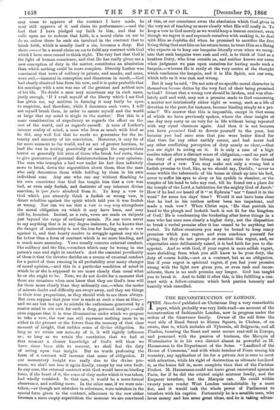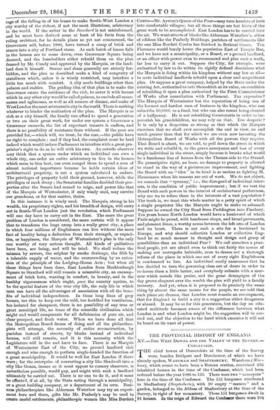THE RECONSTRUCTION OF LONDON.
rilHE Standard published on Christmas Day a very remarkable paper, which probably was very little read—an account of the reconstruction of fashionable London, now in progress under the orders of the Grosvenor family. Owner of the soil from the west side of Bond Street to Sloane Square, in Chelsea, of an estate, that is, which includes all Tyburnia, all Belgravia, and all Pimlico, boasting the finest and most secure rent-roll in Europe, and possessed with the passion of business, the Marquis of Westminster is in his own district almost as powerful as M. Hau.ssmarui in the Department of the Seine. "Landlord of the House of Commons," and with whole batches of Peers among his tenantry, any application of his for a private Act is sure to meet with attention, while his right of destruction as ultimate landlord is, as the leases fall in, more complete than that of the Parisian Prefect. M. Haussmann could not leave great uncovered spaces in Paris, for if he did the evicted might murmur loudly, and the Emperor interfere, but the Marquis can. He could within twenty years render West London uninhabitable by a mere fiat, and it would task the whole power of Parliament to interfere with his caprice. Fortunately he is a sensible man, who loves money and has some great ideas, and he is taking advan-
tage of the falling-in of his leases to make South-West London a city worthy of the richest, if not the most illustrious, aristocracy in the world. If the writer- in the Standard is not misinformed, and he must have derived some at least of his facts from the ruling architect, for he details plans as yet not commenced, the Grosvenors will, before 1880, have turned a camp of brick and stucco into a city of Portland stone. As each batch of leases falls in the houses are to come down, even Grosvenor Square being doomed, and the leaseholders either rebuild them on the plan framed by Mr. Cundy and approved by the Marquis, or the land- lord does it himself. Stucco and sham generally are strictly for- bidden, and the plan as described seeks a kind of congruity of stateliness which, unless it is wisely restricted, may interfere a little too much with comfort. A city needs buildings other than palaces and stables. The guiding idea of that plan is to make the Grosvenor estate the residence of the rich, to cover it with houses which in any other city would be called palaces, to exclude all mean- noses and uglinesses, as well as all sources of disease, and make of 1VestLondon the most aristocratic city in theworld. There is nothing whatever to hinder the realization of the plan. The Marquis is as rich as a city himself, the family can afford to spend a generation .or two on their great work, for under our system a Grosvenor a Grosvenor succeeds, the list of expectant tenants is endless, and there is no possibility of resistance from without. If the poor are provided for,—which will, we trust, he the case,—the public have no right to complain ; and if they had, the complaint must be loud indeed which would induce Parliament to interfere with a great pro- prietor's right to do as he will with his own. An outside observer may think that a system under which an individual can own a whole city, can order an entire aristocracy to live in the houses which seem to him best, can even compel them to spend a sum of Almost national importance because he holds certain ideas of architectural propriety, is not a system calculated to endure. The privileges of property hold their ground, however, while the privileges of rank decay ; the Senatorial families doubled their pro - perties after the Senate had ceased to reign, and power like that of the Marquis of Westminster, if only wisely used, may survive -our grandsons, or for that matter, theirs.
In this instance it is wisely used. The Marquis, strong in his wealth, his proprietary rights, and his breadth of design, will carry out in South-West London just the revolution which Parliament will one day have to carry out in the East. The more the great problem of London is considered, the more certain will it appear that to transform the huge camp into a really great city, a place in which four millions of Englishmen can live without the mere fact of locality being a deduction from their strength, or capaci- ties, or happiness, • the Marquis of Westminster's plan is the only one worthy of very serious thought. All kinds of palliatives have been, are being, and will be tried. We shall reduce the miasma by sewers, the sulphur by smoke drainage, the filth by a tolerable supply of water, and the overcrowding by an exten- sion of the principle of the Lodging-House Acts ; but when all these things have been done, East London from Mecklenburgh Square to Stratford will still remain a miserable city, an encamp- ment of brick huts, wanting in comfort, in beauty, and in the -healthy vigorousness which ought, pace the country squires, to be the special feature of the true city life, the only life in which man can have all the advantages of association with all the bene- fits of individual independence. In those long lines of grey houses, too thin to keep out the cold, too huddled for ventilation, too isolated for cheapness, there is no possibility of any true or great municipal life, no trace of the scientific civilization -which might and would compensate for all deficiencies of pure air, and -clear prospect, and fresh water. When we have done all that the Metropolitan Board dream of doing and all the philanthro- pists will attempt, the necessity of entire reconstruction, by parishes instead of streets, by blocks instead of individual houses, will still remain, and it is this necessity which the Legislature will in the end have to face. There is no Marquis -of Westminster East of the City, no ground landlord rich enough and wise enough to perform single-handed the function of -a great municipality. It would be well for East London if there were ; for the enterprise of converting a city hite Shadwell into a -city like Genoa, insane as it must appear to cursory observers, is nevertheless possible, would pay, and might with such a landlord ultimately be carried out. There is no one to do it, and it must be effected, if at all, by the State acting through a municipality, -or a great building company, or a department of its own. Busi- ness philanthropists like Alderman Waterlow may try an experi- ment here and there, gifts like Mr. Peabody's may be used to create model settlements, philanthropic women like Miss Burdett Coutts—Mr. Ayrton's Queen of the Poor—may turn hamlets of huts into comfortable villages ; but all these things are but hints of the great work to be accomplished. East London has to be carried into the air. We want streets of blocks like Alderman Waterlow's, cities of edifices like the Peabody Buildings, parishes of settlements like the one Miss Burdett Coutts has finished in Bethnal Green. Ten Florences would barely house the population East of Temple Bar, and we have not a municipality, or a Board, or a ground landlord, or an officer with power even to recommend and plan such a work, far less to carry it out. Suppose the City, for example, were authorized by law to do within its rigidly defined dominions what the Marquis is doing within his kingdom without any law at all— to make individual landlords rebuild upon a clear and magnificent plan. Or suppose a great company, helped by the State under the existing Act, authorized to take Shoreditch at its value, on condition of rebuilding it upon a plan authorized by the First Commissioner of Works after consultation with Parliament. Too expensive ? The Marquis of Westminster has the reputation of being one of the keenest and hardest men of business in the kingdom, who can subscribe 10,0001. to a fund, but who can also resent being cheated of a halfpenny. He is not rebuilding Groavenoria in order to im- poverish his grandchildren, we may rely on that. Too despotic ? It is only by a despotism as strong as that which the Marquis exercises that we shall ever accomplish the end in view, an end much greater than that for which we are even now investing the Metropolitan Board of Works with all the powers they require. That Board is about, we are told, to pull down the street in which we write and rebuild it, to the grave annoyance and loss of every single individual in the street, simply because it breaks what would he a handsome line of houses from the Thames side to the Strand. No prescriptive right, no lease, no damage to property is allowed to stand in the way of a picturesque improvement, and fighting the Board with an " idea " in its head is as useless as fighting M. Haussmann when his masons are out of work. We do not object, we concede that "tyranny," i.e., the disregard of individual inter- ests, is the condition of public improvement ; but if we vest the Board with such powers in the interest of architectural perfectness, why are we to refuse them in the interests of a vast population ? The truth is, we treat this whole matter in a petty spirit of which a single proprietor like the Marquis ought to make us ashamed. Suppose he owned the City Road from Paddington into Finsbury. Ten years hence North London would have a boulevard of which Paris might be proud, with handsome shops, and broad pavements, and pleasant limes, a worthy nexus between the left arm of London and its heart. There is not such a site for a boulevard in Europe, and why should collective Loudon or collective Eng- land be so much meaner in thought and design and grasp of possibilities than an individual Peer? We call ourselves a prac- tical people, yet are afraid even to think out fairly the means of making our metropolis habitable, even to dream out a thorough reform of the place in which one out of every eight Englishmen is condemned to live. An individual coolly announces that he has decided to turn the governing class out of doors in order to re-house them a little better, and everybody submits with a mur- mur which sounds like praise, and the great demagogue of the day grows eloquent over the wealth the plan will yield to a family treasury. And yet, when it is proposed to do precisely the same thing by almost the same means for the people, we are told that such plans are dreams, that London must remain an encampment, that for England to build a city is a suggestion either dangerous or absurd. It may be so for this generation, but the day an edu- cated multitude becomes aware of the difference between what London is and what London might be, the suggestion will be car- ried out, and the objection to the hand which executes it will not be based on its want of power.































 Previous page
Previous page